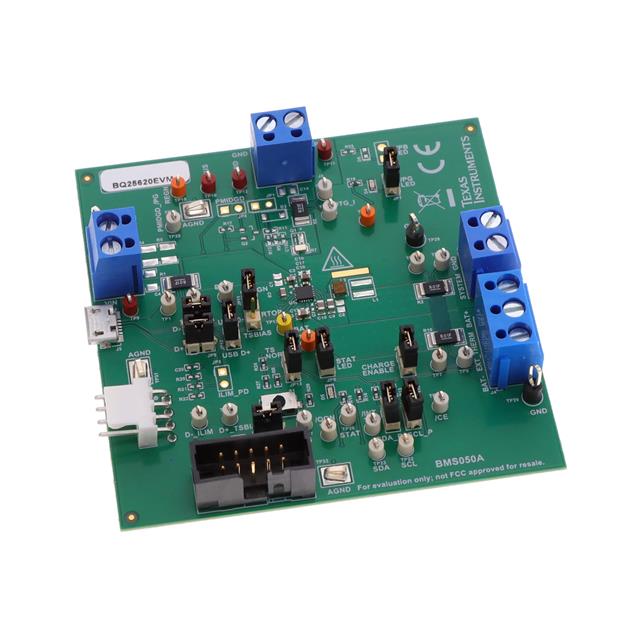
BQ25620EVM
ActiveEVAL BOARD FOR BQ25620
Deep-Dive with AI
Search across all available documentation for this part.

BQ25620EVM
ActiveEVAL BOARD FOR BQ25620
Deep-Dive with AI
Technical Specifications
Parameters and characteristics commom to parts in this series
| Specification | BQ25620EVM | BQ25620 Series |
|---|---|---|
| Battery Chemistry | - | Lithium Ion/Polymer |
| Charge Current - Max | - | 3.5 A |
| Current - Charging | - | Constant - Programmable |
| Embedded | False | False |
| Fault Protection | - | Over Temperature, Short Circuit, Over Current, Over-Under Voltage |
| Function | Battery Charger | Battery Charger |
| Interface | - | I2C |
| Mounting Type | - | Surface Mount |
| Number of Cells | - | 1 |
| Operating Temperature | - | 85 °C |
| Operating Temperature | - | -40 °C |
| Package / Case | - | 18-PowerWFQFN |
| Programmable Features | - | Current, Timer, Voltage |
| Secondary Attributes | Test Points, On-Board LEDs | Test Points, On-Board LEDs |
| Supplied Contents | Board(s) | Board(s) |
| Supplier Device Package | - | 3 |
| Supplier Device Package | - | 18-WQFN-HR |
| Supplier Device Package | - | 2.5 |
| Type | Power Management | Power Management |
| Utilized IC / Part | BQ25620 | BQ25620 |
| Voltage - Supply (Max) | - | 18 V |
Pricing
Prices provided here are for design reference only. For realtime values and availability, please visit the distributors directly
| Distributor | Package | Quantity | $ | |
|---|---|---|---|---|
| Digikey | Box | 1 | $ 118.80 | |
BQ25620 Series
I²C controlled 1-cell 3.5-A buck battery charger with 18-V max input, integrated ADC and OTG output
| Part | Supplier Device Package [x] | Supplier Device Package | Supplier Device Package [y] | Voltage - Supply (Max) [Max] | Package / Case | Charge Current - Max [Max] | Number of Cells | Current - Charging | Interface | Battery Chemistry | Fault Protection | Operating Temperature [Max] | Operating Temperature [Min] | Mounting Type | Programmable Features | Supplied Contents | Function | Secondary Attributes | Utilized IC / Part | Embedded | Type |
|---|---|---|---|---|---|---|---|---|---|---|---|---|---|---|---|---|---|---|---|---|---|
Texas Instruments BQ25620RYKR | 3 | 18-WQFN-HR | 2.5 | 18 V | 18-PowerWFQFN | 3.5 A | 1 | Constant - Programmable | I2C | Lithium Ion/Polymer | Over Current, Over Temperature, Over-Under Voltage, Short Circuit | 85 °C | -40 °C | Surface Mount | Current, Timer, Voltage | ||||||
Texas Instruments BQ25620EVM | Board(s) | Battery Charger | On-Board LEDs, Test Points | BQ25620 | Power Management |
Description
General part information
BQ25620 Series
The BQ25620 and BQ25622 are highly-integrated 3.5A switch-mode battery charge management and system power path management devices for single cell Li-Ion and Li-polymer batteries. The solution is highly integrated with built-in current sensing, loop compensation, input reverse-blocking FET (RBFET, Q1), high-side switching FET (HSFET, Q2), low-side switching FET (LSFET, Q3), and battery FET (BATFET, Q4) between system and battery. The devices use narrow VDC power path management, regulating the system slightly above the battery voltage without dropping below a configurable minimum system voltage. The low impedance power path optimizes switch-mode operation efficiency, reduces battery charging time, extends battery life during discharging phase, and the ultra-low 0.15µA ship mode current extends battery shelf life. The I2C serial interface with charging and system settings makes the BQ25620 and BQ25622 truly flexible solutions.
The BQ25620 supports a wide range of input sources, including standard USB host port, USB charging port, and USB compliant high voltage adapter. It sets the default input current limit based on the built-in D+/D- USB adapter detection interface. BQ25622 has an ILIM pin to set the default input current limit and a TS_BIAS pin for controlled thermistor bias. The device is compliant with USB 2.0 and USB 3.0 power specifications for input current and voltage regulation and meets USB On-the-Go (OTG) operation power rating specification with constant current limit up to 2.4A.
The power path management regulates the system slightly above battery voltage but does not drop below the programmable minimum system voltage. With this feature, the system maintains operation even when the battery is completely depleted or removed. When the input current limit or input voltage limit is reached, the power path management automatically reduces the charge current. As the system load continues to increase, the battery starts to discharge until the system power requirement is met. This supplement mode prevents overloading the input source.
Documents
Technical documentation and resources


